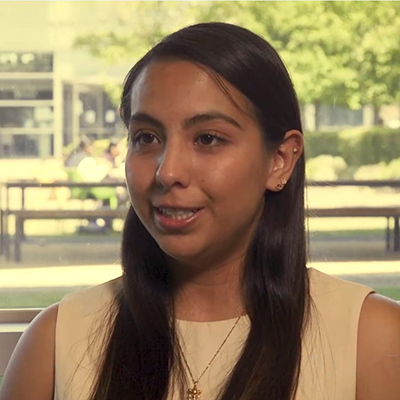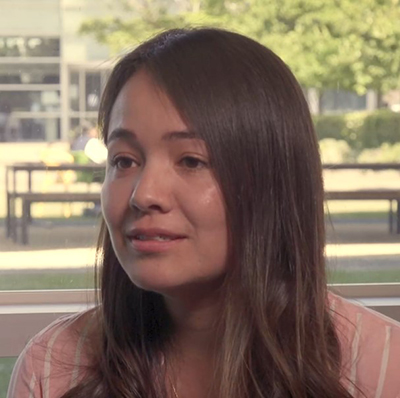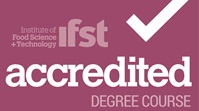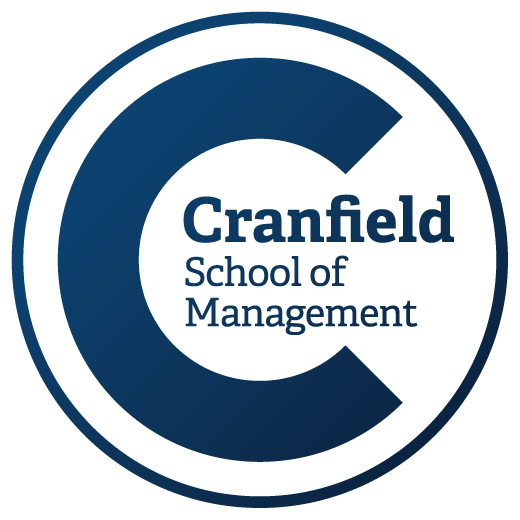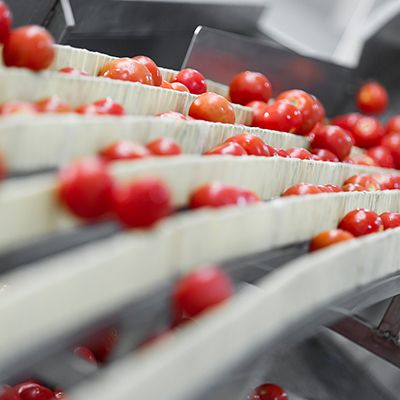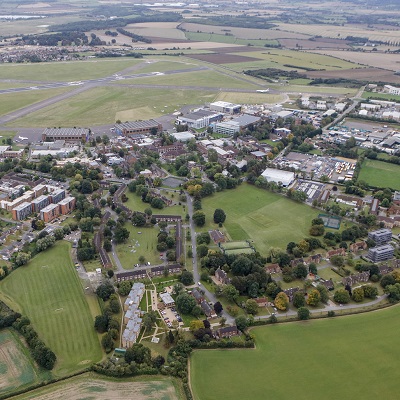Overview
- Start dateFull-time: October, part-time: October
- DurationOne year full-time, two-three years part-time
- DeliveryTaught modules 80 credits/800 hours, Group projects 40 credits/400 hours, Individual project 60 credits/600 hours
- QualificationMSc, PgDip, PgCert
- Study typeFull-time / Part-time
- CampusCranfield campus
Who is it for?
The Food Systems and Management MSc is suitable for new science or technology graduates, or professionals already in the food industry who are interested in furthering their career, and offers flexibility and support for full- or part-time students. Moreover, as part of our commitment with student excellence, both from UK and around the world, we will offer bursaries to outstanding candidates every year. The course will equip you with a critical appreciation of the issues concerned with the production and supply of safe food in the modern world.
The holistic approach of the MSc will provide you with a detailed understanding of the whole food chain system including:
- Food quality
- Food diagnostics
- Food microbiology
- HACCP
- Logistics
- Postharvest technology
- Supply chain management
Your career
Increasing consumer awareness and demand regarding food quality, nutrition and safety issues, coupled with intensifying competition within the rapidly changing food industry, has created a demand for individuals who are able to drive success in the management of key food chains in a modern global economic market.
Cranfield graduates are very successful in achieving relevant work after the course. For professionals already in industry, Cranfield qualifications enhance careers, benefiting both the candidate and their employer.
Graduates of this course have gone on to work in a range of roles, including Senior Development Technologist, Innovation Manager, Supply Chain Coordinator and Associate Principal Scientist. Companies where our graduates have progressed on to include PepsiCo, Chia Company, Bowman’s Ingredients and MMUK.
Specific relevant job roles may include: management, food innovation, production, logistics, research or academia, retail sector, food storage.
Employers will exist in a variety of food-related sectors including: food manufacturers and production companies, food retailers, government agencies, logistics and supply chain, management companies, research institutions.
Cranfield Careers and Employability Service
Our Careers and Employability Service can help you find the job you want after leaving Cranfield. We will work with you to identify suitable opportunities and support you in the job application process for up to three years after graduation. We have been providing master's-level training for over 20 years. Our strong reputation and links with potential employers provide you with outstanding opportunities to secure interesting jobs and develop successful careers. The increasing interest in sustainability and corporate and social responsibility has also enhanced the career prospects of our graduates.
Why this course?
Hear from Rosa Torrelles-Rafales about studying the Food Chain Systems MSc
Our Food Systems and Management MSc represents a unique offering within the UK and Europe as it examines the whole of the food chain ('farm to fork'), from pre-harvest to market. The course has been developed as a result of extensive industry-led research and integrates food science, technology and management.
You will be equipped with the relevant knowledge and skills needed to pursue a wide variety of career opportunities in today's food industry. Practical sessions and field trips are also an integral part of this MSc. With visits and workshops to, for example, McDonald’s headquarters and G’s Fresh you will get a first-hand insight into how large global companies operate.
In association with our internationally-recognised School of Management, the Food Systems and Management MSc offers a module in Leading Corporate Sustainability. This module will outline the major sustainability challenges faced by businesses, explore how companies can respond positively to them, and how corporate action can be best configured to promote responsible and sustainable business strategies.
This MSc is supported by our team of professional thought leaders, including Professor Andrew Thompson who is influential in the field of Agrifood and integral part of this MSc.
Hear from Ida Berg about her experience of studying Agrifood at Cranfield
I was looking for a way to link my nutrition background with the industry and to have a positive impact. I came across the Food Systems and Management master's and I found out that Cranfield has a lot of links with the industry so that really motivated me. I would say Cranfield is challenging, motivating, sustainability-driven and very friendly.
I would say, overall, I really like the content of the course. I think it is very unique and gives you a holistic overview of the food industry. I think in each module you get to know what the challenges are that the industry is facing right now and how you can actually be an active part of improving the industry. For future students, I would say enjoy as much as you can. You won't know how fast the course is going to go, so enjoy every moment, try to be involved as much as you can, take part in all the activities. These activities are made for you to grow as a professional and as a person.
One of the highlights from my time at Cranfield University was the opportunity to work on a group project. We studied climate change impacts on mycotoxins production in commercial food commodities. It was a challenging but rewarding experience to apply our knowledge and skills within the class to find the solution for a real problem.
Informed by industry
Our MSc in Food Systems and Management benefits from the input of an industry advisory panel, with representatives from commercial and non-commercial organisations, who help us to ensure the course is relevant to the current marketplace and industry focused.
Our teaching team are closely involved in industrially funded research, which feeds back into the course and enhances your learning experience.
Many group and individual projects are supported by external organisations. This will expose you to the working environment of food-related companies and their existing challenges.
Course details
The formal taught component of this course comprises seven compulsory modules. Each module is two weeks in duration, consisting of one week of lectures, practical work, site visits and one week for private study (with the exception of one module that consists of two weeks of lectures followed by two weeks of private study). Part-time students attend the first week of each module but may continue with coursework assignments (private study) at a suitable time and location. This element constitutes 40% of the overall mark.
MSc course structure:
Course delivery
Taught modules 80 credits/800 hours, Group projects 40 credits/400 hours, Individual project 60 credits/600 hours
Group project
The group project provides you with an understanding of working on challenges in real work place settings. You will also gain team working, management of resources, report writing, and presentation skills. Many of the projects are supported by external organisations and the experience gained is highly valued by both students and prospective employers. For part-time students a dissertation usually replaces the group project.
This element constitutes 20% of the overall mark.
Individual project
The four-month individual research project can be carried out within industry or academia and, if you are a part-time candidate, it can be undertaken in your place of work. This key part of the course allows you to apply the research skills acquired during the taught phase of the course into your own area of specialism; it can also act as an opportunity for you to meet potential future employers.
Cranfield University actively seeks sponsorship and support for individual thesis projects within the agrifood and environment sector. Thesis sponsors and supporters include PepsiCo Plc, Selva Organic, McDonald’s Restaurants Ltd, GreenWay Foods, Giles Foods, Discovery Foods, Edward Vinson Ltd, KWS Ltd, Greenyard Fresh UK and Whitworth’s, among others.
This element constitutes 40% of the overall mark.
Modules
Keeping our courses up-to-date and current requires constant innovation and change. The modules we offer reflect the needs of business and industry and the research interests of our staff and, as a result, may change or be withdrawn due to research developments, legislation changes or for a variety of other reasons. Changes may also be designed to improve the student learning experience or to respond to feedback from students, external examiners, accreditation bodies and industrial advisory panels.
To give you a taster, we have listed the compulsory and elective (where applicable) modules which are currently affiliated with this course. All modules are indicative only, and may be subject to change for your year of entry.
Course modules
Compulsory modules
All the modules in the following list need to be taken as part of this course.
Food Diagnostics
| Module Leader |
|
|---|---|
| Aim |
This module aims to provide a comprehensive understanding of food diagnostic tools to monitor and analyse food quality and safety, as well as their impact on the management of the supply chain. |
| Syllabus |
|
| Intended learning outcomes |
On successful completion of this module you should be able to:
|
Food Safety
| Module Leader |
|
|---|---|
| Aim |
This module will provide you with an overview of the main hazards encountered along the food chain and the food safety and quality regulatory framework. Special attention will be paid to microbiological hazards (bacteria, viruses and fungal pathogens) relevant to food. The first part of the module aims to provide you with a thorough understanding of the ecology and physiology of bacteria, yeasts and moulds in key food chains and the methods for detecting and controlling spoilage, mycotoxin contamination, and the use of hurdle technology for improving shelf-life. The second part of the module will focus on the current food policy and legislation and the implementation of quality and safety standards in the food industry. This part contains examples of their application to industrially relevant cases. The teaching will be supported by practical work that will complement the theory covered during the lectures. |
| Syllabus |
Introduction to food safety and the main hazard types able to enter different food chains, Introduction and taxonomy of micro-organisms in food production and spoilage, Food-borne pathogens and pathogenicity and natural toxins, Fungal ecology: concepts, fungal contamination in different food chains (e.g., cereals, bakery, fresh produce, cured meats and beverages), heat resistant mould, mechanisms of survival and control, Legislative drivers for mycotoxin control, Hurdle technology: Use of ecophysiological knowledge to increase product shelf-life. Available food processing techniques, Food legislation framework under which food production facilities and industries should work. Some important food chains will be used as examples. The content will focus on: ISO9000 (Food Quality), ISO22000 (Food Safety), ISO45000 (Health and Safety risk), ISO14000 or EMA (Environment). Field Production (GAP, Red Tractor), Food Industry (HACCP, Certification: BRC, IFS). |
| Intended learning outcomes |
|
Leading Corporate Sustainability
| Module Leader |
|
|---|---|
| Aim |
Global sustainability challenges are shaping the way business operates in the 21st century. Businesses are under increasing pressure from multiple stakeholders (for e.g. shareholders, customers, employees, society) to manage their positive and negative impacts with clear responsibility and strategic intent. Leading firms are choosing to respond to these challenges by generating sustainable value propositions to ultimately drive competitive advantage. For many this has meant re-engaging at the level of purpose and re-addressing their role in wider society and for human well-being. This module outlines the major sustainability challenges and explores the capabilities organisations require to respond positively to them. It will engage you in gaining a better understanding of how corporate action can be best configured to promote responsible and sustainable business strategies. In doing so, it will demand management students (as future business managers and leaders) to reflect on the long-standing debate about whether or not ‘the business of business, is still business? This module is 10 credits. Watch video: An introduction to the Leading Corporate Sustainability module |
| Syllabus |
The content is organised around the sustainability management ‘compass’ below: The course content is structured as follows: Part 1: Setting the context Context setting The role of business Exploring possible futures Part 2: Developing the capabilities |
| Intended learning outcomes |
On successful completion of this module you should be able to:
|
Quality of Food and Beverages
| Module Leader |
|
|---|---|
| Aim |
|
| Syllabus |
|
| Intended learning outcomes |
On successful completion of this study you should be able to:
|
Postharvest Technology
| Module Leader |
|
|---|---|
| Aim |
This module provides you with the principles behind the processes affecting the postharvest physiological and functional quality and to apply this knowledge in ‘real-world’ industrial strategies. |
| Syllabus |
|
| Intended learning outcomes |
On successful completion of this module you should be able to:
|
Food Chain Resilience
| Module Leader |
|
|---|---|
| Aim |
|
| Syllabus |
SC concepts and strategies, |
| Intended learning outcomes |
On successful completion of this module you should be able to:
|
Agrifood Business Innovation
| Module Leader |
|
|---|---|
| Aim |
|
| Syllabus |
This module explores current and future challenges that different sectors of the food chain are facing. The content will thus be flexible and 50% of content will depend on the different speakers. On the other hand, some common areas will be covered including: |
| Intended learning outcomes |
On successful completion of this module you should be able to:
|
Teaching team
The Course Director is Dr Lembe Magwaza and the Deputy Course Director is Dr Zoltan Kevei.
The teaching team draw expertise from different areas within Agrifood (Plant Science, Food Mycology) and Management themes. In addition, you will benefit from a programme of visiting lecturers from industry and world-leading research organisations.
Accreditation
The MSc of this course is accredited by Institution of Agricultural Engineers and Institute of Food Science and Technology.
